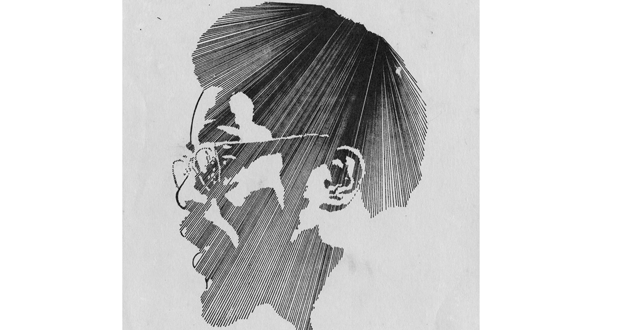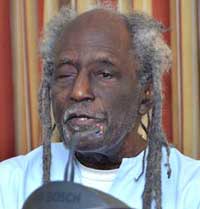Kwayana recalls Burnham’s threat:
‘They had better make their will…One must die, we know that the PNC will live’
- as he spends another day testifying at Rodney COI
PRIOR to the alleged assassination of Dr. Walter Rodney, the Working People’s Alliance (WPA) of which he was co-founder, had heard death threats uttered by People’s National Congress (PNC) Leader, Forbes Burnham.But the WPA members had no idea to what extent such threats would go, said 89-year-old Eusi Kwayana, one of the founders, who now resides in San Diego, California, United States (U.S.).
Testifying, again before the Commission of Inquiry (COI) into the death of Rodney, he was led by lead Counsel Glen Hanoman when the hearings resumed at the Supreme Court Law Library, in Georgetown, before Commissioners Sir Richard Cheltenham and Seenath Jairam and Jacqueline Samuels-Brown.
Kwayana said Burnham’s threats were a declaration of war and they were directed against the WPA.
The witness was reminded of such threats when Hanoman drew his attention to excerpts from a compilation titled ‘Report on the Third Biennial Congress of the PNC, August 22-26, 1979.’
This computation, according to Kwayana, contained “significant words” spoken by Burnham and was tendered in evidence. Furthermore, a booklet with the title ‘Assassination of Dr. Walter Rodney’ was also submitted as an encapsulation of part of Kwayana’s testimony.
It was the work of the WPA surrounding investigations into the death of Rodney, along with responses to the Government’s propaganda, Kwayana said.
BURNHAM’S WORDS
The following words of Burnham from pages 342 and 343 of the Report on the Third Biennial Congress of the PNC were read by Kwayana, with the aid of Hanoman:
“As for the Worst Possible Alternative, upon whose bandwagon the formal opposition seeks to climb… (And may I digress to deal with this for a moment) I think this is an indication of the ossification of the minds of those who lead the formal opposition. The Worst Possible Alternative comes along, so the formal opposition climbs on the bandwagon, hoping to gain entry into the solid proletarian areas through the Worst Possible Alternative. The formal opposition cannot go to Linden and hold any meeting; they have neither the physical apparatus nor the courage. However, they hope that the WPA will give them entry. The Worst Possible Alternative has no use, as their pickets outside Eve Leary last month showed, for the formal opposition because they say that the Leader of the formal opposition does not know what he is doing.
“Let me tell the formal opposition this: The Worst Possible Alternative has held its last meeting at Linden; that is the last meeting that they have held at Linden, and the PPP has also held its last meeting in Linden. Why this attack on the PNC proletarian strongholds? They realise that we hold the urbanised proletarian working class. They realise further that we have made substantial inroads amongst the rural agricultural workers, as successive elections have established and proved. Therefore, it is the hope that, with a glossy radical rhetoric, they, the PPP, can ride into office on the backs of the Worst Possible Alternative. But comrades, let me say this: ‘Never the day canoe bore punt.’
WARNING
“I have given warning in accordance with the mood, as I interpret it, of the Third Biennial Congress which came to an end this afternoon. I repeat that the PNC stands for peace not conflict. The PNC will never start violence. The PNC did not ask for a confrontation. But comrades, as I said on Thursday, the battle is joined, no holds are barred. Comrades, they had better make their wills, because so far as we are concerned, we are not asking them for quarter and we will not give them any.
“Comrades, we are now in the Roman Amphitheatre. The lion and the gladiator cannot both survive; one must die, and we know that the PNC will live.”
Explaining the phrase: “Never the day canoe bore punt” Kwayana said, in his opinion, that just as the canoe is inferior to the punt, so the WPA was portrayed to be inferior to the PNC.
Meanwhile, Kwayana said people identified Dr. Rodney as a new force in the society who they found inspiring and unaffected by the damage done in the past.
“So the WPA became even more popular and stronger and began to look at things which were being ignored in the country. Human rights were being cut off one after the other. These rights began to be set aside on the ground that in the foremost European countries, revolutionary countries…they were regarded as no longer necessary. And that was a conflict. And we began to say that the right to vote was an important right, the right to speak was an important right, and the right to publish was an important right. And so we came into conflict with this new third world authority.”
He said the party also began supporting trade unions, students’ educational rights, the Mirror Newspaper and the Catholic Standard.
“All of these people were suffering. The Government controlled the newsprint with a tight hand.”
Kwayana said he became a political person in 1947 when Dr. Cheddi Jagan was getting into the Legislative Council.
“From then on, I became active in the politics of Guyana as well as in the culture. I’m regarded as a very controversial figure so people take me to be a public danger.”
SYDNEY KING
His name at birth was Sydney King but he later changed it to Eusi Kwayana which means ‘Black Man of Guyana.’ In 1953, he recalled that he was Minister of Communications and Works and that his stay in Parliament was for four months.
Kwayana said he was in the People’s Progressive Party (PPP) as a founder member. “My reason for getting active in politics was the fact that Dr. Jagan was an Indian and was making such a remarkable review and explanation of the dying colonial system and I felt he should not be alone. I took the risk.”
In 1956, he recalled that he got into controversy with the leadership of the PPP over the issue of support for the West Indian Federation and so he withdrew because he felt the reasons given were not consistent with their original beliefs.
Sometime after, Kwayana joined the PNC as Editor of New Nation and later as General Secretary. He was, subsequently, deemed a racist by the PNC and expelled.
“The PPP took a similar position. I could not freely walk the streets of Georgetown in those days. It will be disastrous. So now I am a non-party person. The political divisions led to the unfortunate development of violent ethnic conflict.”
According to Kwayana, Burnham had said that if he lost the 1961 elections, he was willing to go on a plane with Dr. Jagan and support independence. “He also said if the PPP won, we could only regain our freedom by bloody rebellion.”
After this, the African Society for Racial Equality was established with a handful of people. Some years after, the African Society for Cultural Relations with Independent Africa (ASCRIA) was born. ASCRIA took up the question of corruption.
“Corruption had begun to raise its head within the ranks of the PNC Government and certain individuals were pinpointed and we were carrying a public campaign for a code of conduct and against corruption because we knew that corruption had already begun to wreak havoc,” he related.



